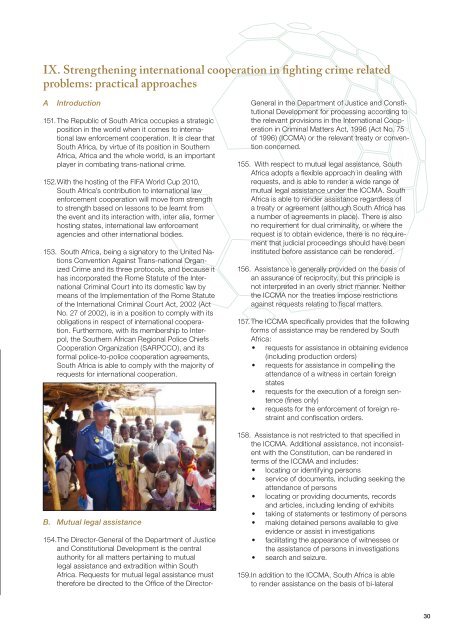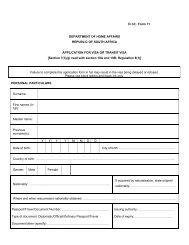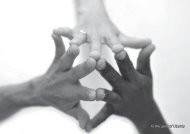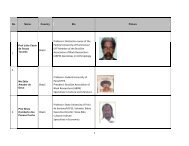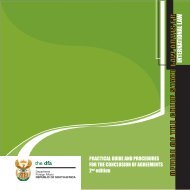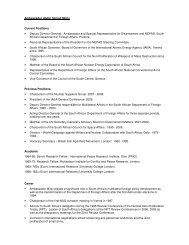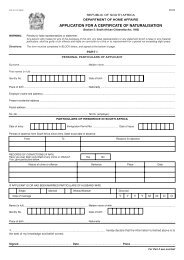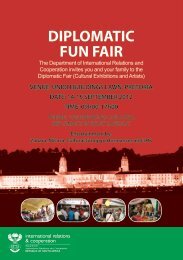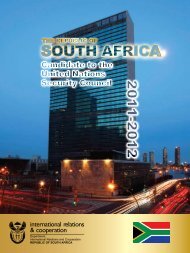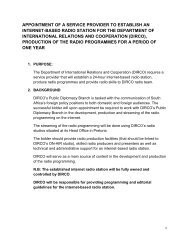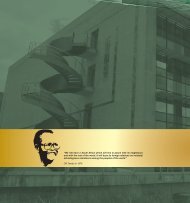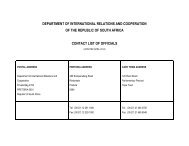Read more - Department of International Relations and Cooperation
Read more - Department of International Relations and Cooperation
Read more - Department of International Relations and Cooperation
Create successful ePaper yourself
Turn your PDF publications into a flip-book with our unique Google optimized e-Paper software.
IX. Strengthening international cooperation in fighting crime related<br />
problems: practical approaches<br />
A<br />
Introduction<br />
151. The Republic <strong>of</strong> South Africa occupies a strategic<br />
position in the world when it comes to international<br />
law enforcement cooperation. It is clear that<br />
South Africa, by virtue <strong>of</strong> its position in Southern<br />
Africa, Africa <strong>and</strong> the whole world, is an important<br />
player in combating trans-national crime.<br />
152. With the hosting <strong>of</strong> the FIFA World Cup 2010,<br />
South Africa’s contribution to international law<br />
enforcement cooperation will move from strength<br />
to strength based on lessons to be learnt from<br />
the event <strong>and</strong> its interaction with, inter alia, former<br />
hosting states, international law enforcement<br />
agencies <strong>and</strong> other international bodies.<br />
153. South Africa, being a signatory to the United Nations<br />
Convention Against Trans-national Organized<br />
Crime <strong>and</strong> its three protocols, <strong>and</strong> because it<br />
has incorporated the Rome Statute <strong>of</strong> the <strong>International</strong><br />
Criminal Court into its domestic law by<br />
means <strong>of</strong> the Implementation <strong>of</strong> the Rome Statute<br />
<strong>of</strong> the <strong>International</strong> Criminal Court Act, 2002 (Act<br />
No. 27 <strong>of</strong> 2002), is in a position to comply with its<br />
obligations in respect <strong>of</strong> international cooperation.<br />
Further<strong>more</strong>, with its membership to Interpol,<br />
the Southern African Regional Police Chiefs<br />
<strong>Cooperation</strong> Organization (SARPCCO), <strong>and</strong> its<br />
formal police-to-police cooperation agreements,<br />
South Africa is able to comply with the majority <strong>of</strong><br />
requests for international cooperation.<br />
B. Mutual legal assistance<br />
154. The Director-General <strong>of</strong> the <strong>Department</strong> <strong>of</strong> Justice<br />
<strong>and</strong> Constitutional Development is the central<br />
authority for all matters pertaining to mutual<br />
legal assistance <strong>and</strong> extradition within South<br />
Africa. Requests for mutual legal assistance must<br />
therefore be directed to the Office <strong>of</strong> the Director-<br />
General in the <strong>Department</strong> <strong>of</strong> Justice <strong>and</strong> Constitutional<br />
Development for processing according to<br />
the relevant provisions in the <strong>International</strong> <strong>Cooperation</strong><br />
in Criminal Matters Act, 1996 (Act No. 75<br />
<strong>of</strong> 1996) (ICCMA) or the relevant treaty or convention<br />
concerned.<br />
155. With respect to mutual legal assistance, South<br />
Africa adopts a flexible approach in dealing with<br />
requests, <strong>and</strong> is able to render a wide range <strong>of</strong><br />
mutual legal assistance under the ICCMA. South<br />
Africa is able to render assistance regardless <strong>of</strong><br />
a treaty or agreement (although South Africa has<br />
a number <strong>of</strong> agreements in place). There is also<br />
no requirement for dual criminality, or where the<br />
request is to obtain evidence, there is no requirement<br />
that judicial proceedings should have been<br />
instituted before assistance can be rendered.<br />
156. Assistance is generally provided on the basis <strong>of</strong><br />
an assurance <strong>of</strong> reciprocity, but this principle is<br />
not interpreted in an overly strict manner. Neither<br />
the ICCMA nor the treaties impose restrictions<br />
against requests relating to fiscal matters.<br />
157. The ICCMA specifically provides that the following<br />
forms <strong>of</strong> assistance may be rendered by South<br />
Africa:<br />
• requests for assistance in obtaining evidence<br />
(including production orders)<br />
• requests for assistance in compelling the<br />
attendance <strong>of</strong> a witness in certain foreign<br />
states<br />
• requests for the execution <strong>of</strong> a foreign sentence<br />
(fines only)<br />
• requests for the enforcement <strong>of</strong> foreign restraint<br />
<strong>and</strong> confiscation orders.<br />
158. Assistance is not restricted to that specified in<br />
the ICCMA. Additional assistance, not inconsistent<br />
with the Constitution, can be rendered in<br />
terms <strong>of</strong> the ICCMA <strong>and</strong> includes:<br />
• locating or identifying persons<br />
• service <strong>of</strong> documents, including seeking the<br />
attendance <strong>of</strong> persons<br />
• locating or providing documents, records<br />
<strong>and</strong> articles, including lending <strong>of</strong> exhibits<br />
• taking <strong>of</strong> statements or testimony <strong>of</strong> persons<br />
• making detained persons available to give<br />
evidence or assist in investigations<br />
• facilitating the appearance <strong>of</strong> witnesses or<br />
the assistance <strong>of</strong> persons in investigations<br />
• search <strong>and</strong> seizure.<br />
159. In addition to the ICCMA, South Africa is able<br />
to render assistance on the basis <strong>of</strong> bi-lateral<br />
30


